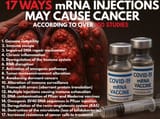Search Results
7/9/2025, 1:33:25 AM
>>509874666
Thats fe 17 mechanisms induced by mRNA platform that can give you cancer:
1. Genome instability – mRNA may integrate into DNA, causing mutations.
2. Immune escape – Spike disables tumor suppressors like p53.
3. Impaired DNA repair – Spike disrupts genomic repair enzymes.
4. Chronic inflammation – LNPs & spike fuel cancer-promoting inflammation.
5. Immune suppression – T-cell & interferon decline weakens surveillance.
6. RNA disruption – Codon optimization derails microRNA function.
7. Oncogenic signaling – Activates PI3K/mTOR & MAPK pathways.
8. Tumor microenvironment – LNPs accumulate in tumors, speeding spread.
9. Reawakening dormant cancers – Disrupts immune control of latent tumors.
10. Immune surveillance failure – m1Ψ-modified RNA blocks toll-like receptors.
11. Frameshift errors – mRNA can produce unintended, harmful proteins.
12. Immune exhaustion – Boosters promote IgG4 & tolerance to cancer.
13. DNA contamination – Plasmid DNA may integrate into host genome.
14. SV40 sequences – Known tumor-promoter found in Pfizer vials.
15. RAS deregulation – Spike overactivates AT1R, driving proliferation.
16. Microbiota damage – Loss of bifidobacteria impairs anticancer defense.
17. Treatment resistance – Spike protein blunts chemo response.
Integration events are only a part of the problem
Thats fe 17 mechanisms induced by mRNA platform that can give you cancer:
1. Genome instability – mRNA may integrate into DNA, causing mutations.
2. Immune escape – Spike disables tumor suppressors like p53.
3. Impaired DNA repair – Spike disrupts genomic repair enzymes.
4. Chronic inflammation – LNPs & spike fuel cancer-promoting inflammation.
5. Immune suppression – T-cell & interferon decline weakens surveillance.
6. RNA disruption – Codon optimization derails microRNA function.
7. Oncogenic signaling – Activates PI3K/mTOR & MAPK pathways.
8. Tumor microenvironment – LNPs accumulate in tumors, speeding spread.
9. Reawakening dormant cancers – Disrupts immune control of latent tumors.
10. Immune surveillance failure – m1Ψ-modified RNA blocks toll-like receptors.
11. Frameshift errors – mRNA can produce unintended, harmful proteins.
12. Immune exhaustion – Boosters promote IgG4 & tolerance to cancer.
13. DNA contamination – Plasmid DNA may integrate into host genome.
14. SV40 sequences – Known tumor-promoter found in Pfizer vials.
15. RAS deregulation – Spike overactivates AT1R, driving proliferation.
16. Microbiota damage – Loss of bifidobacteria impairs anticancer defense.
17. Treatment resistance – Spike protein blunts chemo response.
Integration events are only a part of the problem
Page 1
